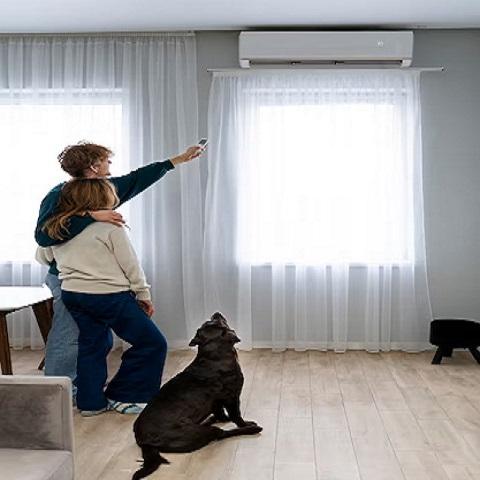
The last thing you want is for your air conditioner to stop working in the peak of summer. But it happens, and there are things you can do to address it from easy fixes to professional repairs. If your air conditioner is blowing hot air, follow these steps to see if you can remedy it yourself. For more complicated issues like malfunctioning compressors and evaporator coils or leaks in the ductwork, you’ll need to call in a trusted HVAC expert. As a note, you should not try to fix any suspected electrical issues on your own—contact a professional instead.
7 Reasons Why Your AC is Blowing Hot Air
If you’re wondering, “How do I fix my AC blowing warm air,” you should start here. These are some of the most common reasons why your AC is not properly cooling your home.
- Incorrect Thermostat Settings
Before you go inspecting your indoor AC unit, you should double-check the settings on your thermostat to potentially save yourself some work. Make sure your thermostat is set to “cool” and that the temperature is low enough. You should also check the fan setting. If the fan is set to “on,” it will continue to run even if a cooling cycle is not running. Set it to “auto” and see if that fixes the problem. If your AC still blows hot air, move on to the next step.
- Clogged/Dirty Air Filter
A clogged or dirty air filter can reduce the internal airflow to your AC unit. An AC without enough internal airflow will have to work harder to cool your home, driving up energy bills, and it won’t function as well as it should. Dirty air filters will also circulate dust, allergens, and other pollutants throughout your home. During peak cooling season, you should change your air filter at least once a month.
- Frozen Evaporator Coil
If the evaporator coil in your AC unit has not absorbed heat for a long time, refrigerant can cause them to freeze.
Here are four things that would prevent evaporator coils from absorbing hot air:
- A Dirty Air Filter: Dirt and debris are blocking warm air from entering the return vent
- A household object like a sofa or blanket is blocking a return vent and preventing airflow
- Dirty Evaporator Coil: The evaporator coil is covered in a layer of grime and air cannot pass through it. If dirt has reached the evaporator coil, you may have a defective air filter or cracks or fissures in your air ducts.
- Collapsed Air Duct: A less common issue, your air duct has collapsed because of wear and tear, poor installation or pests, and air from the return vent cannot reach the coil.
Your indoor air may start to smell musty if you have a frozen evaporator coil.
If you don’t notice any of the above issues, your system might be low on refrigerant, leading to a frozen evaporator coil.
- Leaks in the Ductwork
A big enough leak in your home’s ductwork may be the reason your AC is blowing warm air. The ductwork delivers cool air throughout your home, but if there is a leak, warm air can be mixed into the already-cooled air, causing warmer-than-normal air to blow through your vents. You’ll need to contact a qualified HVAC technician to address ductwork issues. Getting your ductwork cleaned and serviced every three to five years can help prevent these kinds of issues.
- Refrigerant Leak
Your AC unit depends on refrigerant to produce cold air. If the refrigerant is escaping through a leak, your AC will not be able to blow any cold air. An easy way to spot a refrigerant leak is if the evaporator coil has frosted over but cold air is not blowing in your home.
- Malfunctioning Compressor
The compressor is what allows refrigerant to be turned from a gas to a liquid in order to cool the air. If your compressor isn’t working, refrigerant cannot be cycled through the AC unit, and thus the unit cannot produce cold air.
- Outdoor Unit Lost Power
An older outdoor AC unit can blow a fuse if it is overworked on a hot day. This is because older units will struggle to meet your cooling needs and require too much power. The circuit becomes overloaded, and if the fuse overheats, the circuit will be disabled.
More modern AC setups incorporate a circuit panel instead of a fuse that “trips” when the circuit is overworked. If this happens, you can simply flip the switch back to “on.”
Contact Stephens Plumbing
If you’ve followed these steps on how to fix an AC that’s blowing hot air and have identified the need for a complicated repair or still cannot find the source of the problem, it’s time to call in an experienced HVAC technician. The certified HVAC contractors at Stephens Plumbing are ready to service, repair, or replace your AC system. Contact us today to get your AC functioning properly and your home cool and comfortable again.

